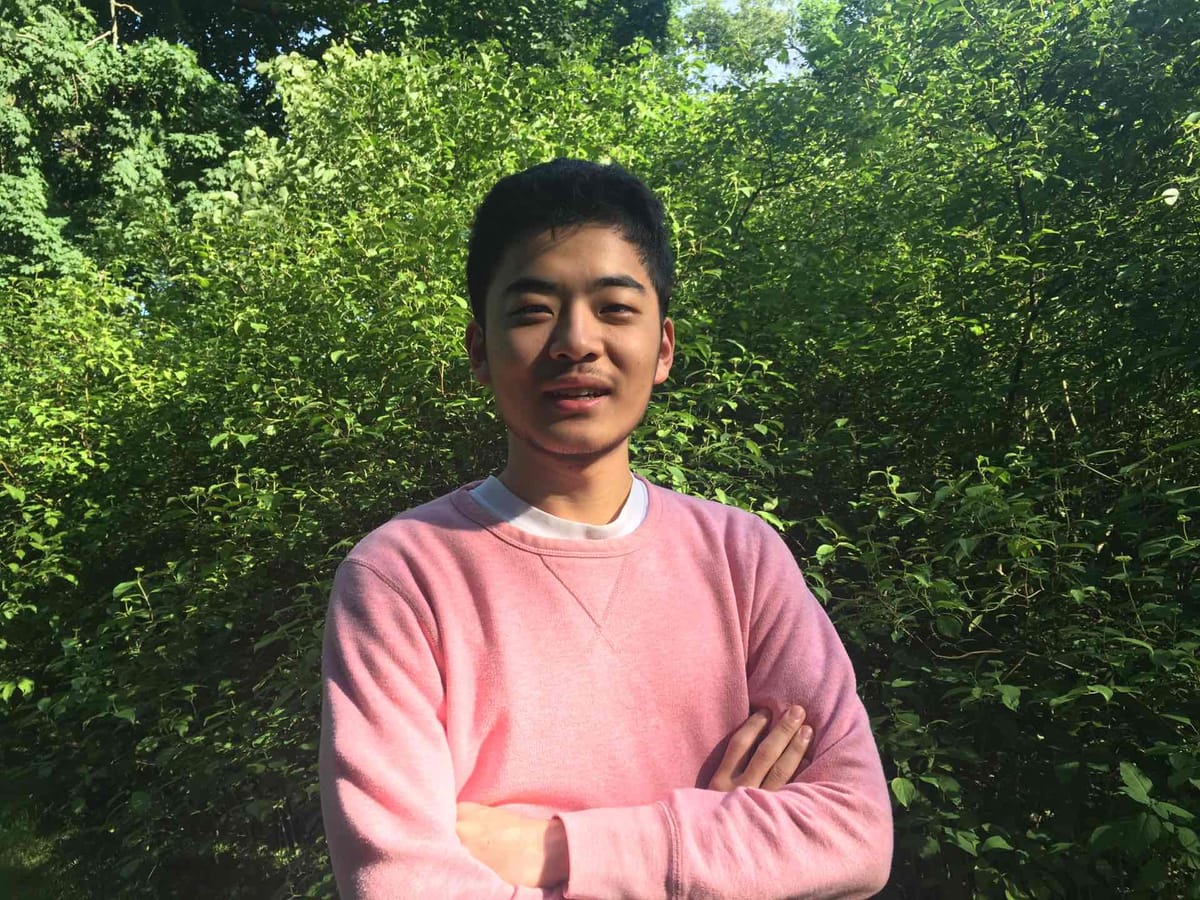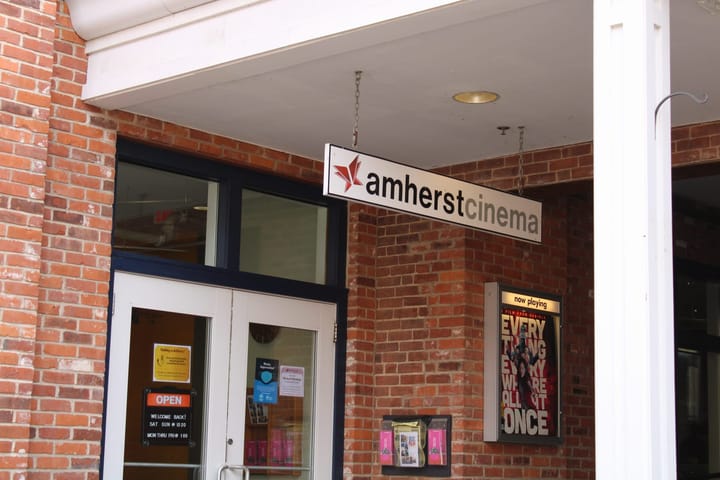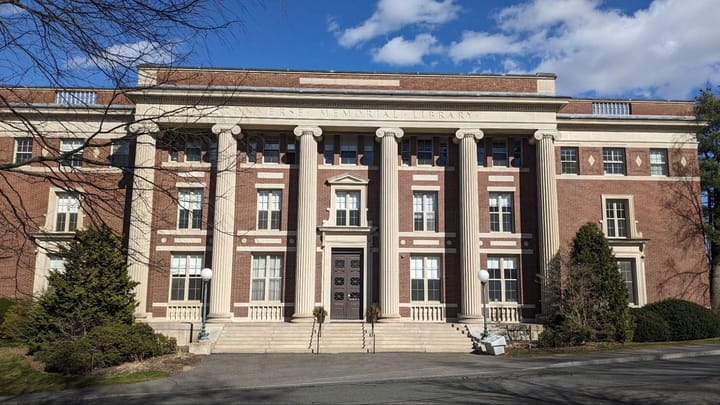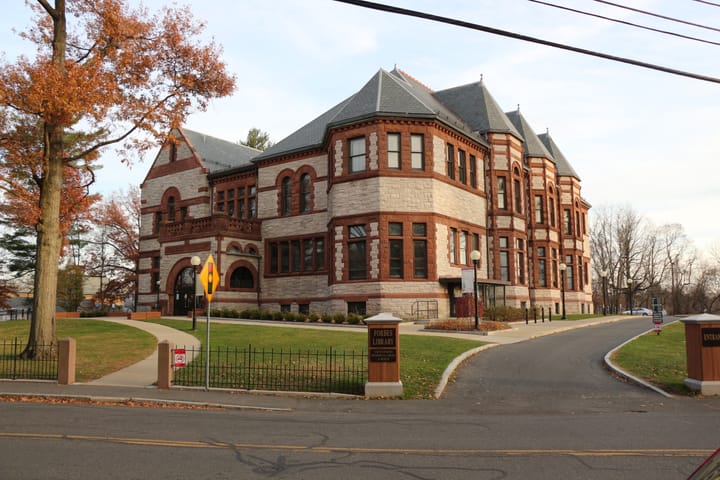“If You Want to Act, Understand the Stage”

Yixin “Arthur” Xiao ’19 sees the world through the lens of a different language. It’s not because he came to Amherst as an international student from a home on the southern coast of China, but it is because he sees the world, and all within it, through the language of physics.
He is able to recognize the world for its microparticles and envision how they interact through time and space, yet he is also able to zoom out to imagine entire worlds in mathematical theory. And somehow, he makes this clear while keeping conversation personable and friendly.
Seeing the Parts within a Whole When we met, Xiao was wearing a soft pink t-shirt, a color that matches his bright and gently kind demeanor. It’s a character trait that is automatically clear upon talking to him. He thoughtfully explained the nuances of his physics research to me, someone who managed to graduate high school while evading physics requirements, in a way that was neither condescending nor too complicated. “I don’t want to ‘dumb it down’ for you,” he said when I asked that he do so, “because you are not dumb, and I am not dumb either, so why would we? So let’s try. Perhaps I could simplify.” It was a sideline comment, but it shows how closely Xiao looks at words, the world and their meanings.
While the quantitative approach to physics seems distant from the qualitative traits in studies of language, Xiao makes it clear how hand-in-hand the two actually go. Both demand a closely critical eye, an ability to look at parts within a whole and a vast imagination.
Electrically Interdisciplinary Xiao entered Amherst without much of an idea of what to pursue, knowing that he wanted to embrace the liberal arts philosophy of the college. He originally intended to double major in one quantitative and one qualitative subject. Physics and math soon gripped his imagination, as did English. In taking his first English class, “I felt something I have never felt before that really electrified me,” Xiao said.
“Arthur was definitely electric,” said Professor of English Geoffrey Sanborn, who taught the English courses that sparked Xiao’s love for the subject. “He was extremely interested in both the books and our discussions, and that came through both in his comments and in his written work … He probably came to more of my office hours than any other student that semester too, and he was electric there as well. He’s got a lot of energy flowing from his life into his intellectual pursuits, and you could feel that in the room.”
In physics, too, Xiao exudes his passion for both the experimental and theoretical sides of the subject. He defined the difference between experimental physics as a pursuit that is trying to model the world, while theoretical physics is trying to imagine new ones. This theoretical approach demands that scholars imagine “a new world, a new landscape,” which to Xiao is “mind-bogglingly freeing.” In theory, “imagination is the limit, but there is no limit,” as is the case, he observes, with literature.
Despite continuing to take English classes nearly every semester, he has relinquished the thought of majoring in English in exchange for exploring a wider breadth of subjects — a true pursuit of the liberal arts. “It turned out to be a good thing [to make this choice not to double major]. I’m lucky that I actually really liked doing different things,” he said.
Bettering the Physical World It was this genuine interest in interdisciplinary topics that gave Xiao the push to pursue physics in college. In his first year, award-winning journalist Naomi Klein gave the DeMott Lecture during Orientation on her book “This Changes Everything” and the role of capitalism in climate change. Xiao said that he knew climate change was a problem, but it was after reading Klein’s book that he realized the depth of the problem and the need to address it. “That’s why I chose physics. I wanted to understand how the world physically worked,” he said. He sees solutions to climate change as involving both policy and new technology.
So, as he leaves Amherst, Xiao has chosen to use his physics knowledge to pursue the latter half of that equation. He will join a five-year doctorate program at the University of Michigan under a Principal Investigator (P.I.) who has a doctoral degree in applied physics. His P.I. works on renewable energy projects, with concentrations on artificial photosynthesis and solar water splitting, which essentially uses solar energy to split water into oxygen and hydrogen so that the hydrogen can be used in a hydrogen fuel cell. To Xiao, his future team brings a unique perspective to renewable energy work since most approach it from a purely chemical standpoint. It’s yet another decision that demands the interdisciplinary approach and knowledge Xiao is so apt at applying.
However, despite his definite qualifications for the program, Xiao is still nervous about launching into it, noting that he will be completely new to both the method and the process of the work.
According to his thesis and summer research advisor David Hall ’91, professor of physics, it’s this discomfort with uncertainty and drive to automatically grasp the answers that is characteristic of Xiao and his work. “Very often students start out wanting the exact answer … I’d say he likes that [precise answer] more than most students,” Hall said. “When he started out he was faced with the not-perfect, messy world. The biggest challenge is to move away from perfection into the physical world.”
Yet, it’s this striving for answers and perfection that Hall believes are the very same characteristics that will make Xiao a great engineer. “I’m not too surprised he wants to be an engineer; he wants to take a world that’s messy and neaten it,” he said. Additionally, he sees Xiao’s appreciation for the arts and humanities as something that will help him succeed in engineering. “The world needs engineers that have an appreciation for people. He’ll go off and have good perspective,” Hall said.
Coiling Cables and the Connections In and Out of Physics Lab After working with Xiao for two summers and one year advising on thesis research, Hall is well situated to understand Xiao’s appreciation for people. Xiao himself described the close-knit atmosphere within the physics department, and Hall feels that it was only strengthened through the adversity of having to up and move all the lab experiments this past summer as the department transferred into the new Science Center.
“The relationship you build up from common toil in the lab or in front of a document is strong. It becomes not just about the document or the math. Some of those discussions that occur when you’re coiling cables or pointing lasers are different,” said Hall.
He appreciates Xiao as not just a collaborator — Hall explained that often he was learning from Xiao, who would challenge his assertions and math and make them stronger in doing so — but also as a person within the physics community. Simply put: “I’ll be sad when he’s gone,” Hall said.
Xiao’s work with Hall — and what he ultimately wrote his honors thesis on — focuses on experiments to realize the novel bulk properties of Bose-Einstein condensates, using rubidium-87 atoms. For those of us who are not well-versed in the terminology of high-level physics, a Bose-Einstein condensate is essentially what emerges with the cooling of a group of particles (called bosonic particles) to very low temperatures. In such a state, the quantum interactions of the particles are clear and provide a “direct window” to the world of quantum mechanical wave forms, explained Xiao. “Condensates give a chance to intuitively see how quantum mechanics actually work,” he said. “The beauty is that once you do it, you see it as if you see a ball rolling down a hill.”
A Winding Path, Honing Liberal Arts Studies Whether it’s to closely analyze the waveforms of rubidium condensates or the social dynamics of the world around him, Xiao brings a deep curiosity and keen eye. It’s a lens that’s been shaped and honed by his winding road to Amherst.
After a childhood on the southern coast of China, Xiao began a pursuit of rigorous education when he started school not too far from home in an experimental public boarding school program at the age of 12. It’s here that he saw himself gaining a sense of independence and high-level academic rigor.
After the school’s experiment ended rather abruptly, however, he wound up as a ninth-grade international student at a Catholic day school — in Austin, Texas, of all places.
From there, he transferred to the Millbrook School, a private boarding school in upstate New York. And at Millbrook, Xiao “began seeing absurdity in the mundane” and viewing the world and the privilege that surrounded him with a critical eye.
An International Love for Learning With a perspective that has been honed by school in Texas, upstate New York, rural Massachusetts and Southern China, Xiao has a deep understanding of the educational approaches of both China and the U.S., which is essential for the work he has done with Amherst’s Liberal Arts Initiatve Summer Seminars (LAISS).

The program brings Amherst professors to China to meet high school students. It’s premised on cultural exchange, so that students may better understand what a liberal arts education entails and the professors may better understand Chinese students. Xiao has worked closely with this program as the Amherst student organizer, coordinating everything from student enrollment to professor schedules. He loves the program because it sparks the same love for liberal arts in young students that he himself embodies.
Xiao’s curiosity and questioning to better understand the world truly define his character. “If you want to act, you better understand the stage,” he said. To him, physics is the course of understanding our stage, which is the world that surrounds us. But it is a course that is incomplete without also understanding and interrogating the social, political and interpersonal dynamics within it.
Correction: An earlier version of this article misspelled the word “electrically.” The article was updated with the correct spelling on Friday, May 24, 2019 at 2:37 p.m.





Comments ()